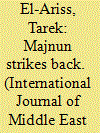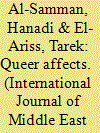| Srl | Item |
| 1 |
ID:
125957


|
|
|
|
|
| Publication |
2013.
|
| Summary/Abstract |
This article examines the association of homosexuality with madness in two contemporary novels, Hanan al-Shaykh's Innaha London ya ?Azizi (Only in London) and Hamdi Abu Golayyel's (Julayyil) Lusus Mutaqa?idun (Thieves in Retirement). Through a comparative reading of the figure of Majnun, an impassioned lover and mad rebel, I argue that literary articulations of queer desire operate as embodied resistance to social and political normativity, both in the Arab world and in the diaspora. Discussing the aesthetic transformation of the contemporary novel and drawing on the Arab-Islamic literary and philosophical tradition, I critically engage Michel Foucault's reading of sexual and epistemological developments in light of current debates about Arab homosexuality. I show how discursive models of sexuality are situated in modernity's intertwinement with other structures of power and systems of belief, crossing cultural contexts and linguistic registers.
|
|
|
|
|
|
|
|
|
|
|
|
|
|
|
|
| 2 |
ID:
125731


|
|
|
|
|
| Publication |
2013.
|
| Summary/Abstract |
When we and several authors of the articles included here originally debated the idea of this special issue, our aim was to respond to what we perceived as a standstill that locks Middle Eastern queer studies into a premodern Eastern versus modern Western-oriented division. While the East is studied as a repository of tradition with an identifiable sexual and amorous nomenclature, the West is often presented as a fixed hegemonic structure distinct from the East, regardless of the long traditions of cultural exchange and the specific forms of translation and dialogue that take shape when the identities and models of desire associated with the West travel or are performed outside it or at its periphery. This division has generated a set of binaries pertaining to the applicability of terms (gay, lesbian, homosexual) and theoretical frameworks (queer theory) to Middle Eastern literary and cultural contexts. It is our belief that critical engagements with queer Arab and Iranian sexualities in literature and culture ought to situate current discussions in queer theory within debates and concerns arising from specific Middle Eastern social and political realities.
|
|
|
|
|
|
|
|
|
|
|
|
|
|
|
|